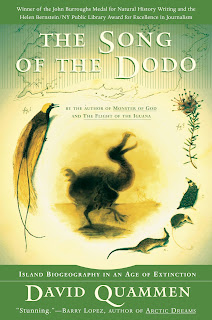I remember a scientist saying that many of the amphibians
around the world are going to go extinct and that it would be better to stop
extreme conservation efforts and, rather, study these species so that we will
know what we have lost. What we are
losing. I think this scientist was
speaking from a dark place in the face of unprecedented declines. In other words, he wasn’t in his happy place.
For those of us who love the natural
world, it is sometimes hard to find *that* place where we can be filled enough
with curiosity and wonder to prevent our knowledge of biodiversity loss
trespass into the moment.
I just started reading The
Song of the Dodo (1996) by David Quammen with some other folks in the
department—I predict we are going to a dark place eventually, but we are not
there yet. What has struck me most is
the journey of Alfred Russel Wallace into the Amazon then onto the Malayan
Archipelago. Or maybe it is simply
Wallace who strikes my fancy. In modern
times he would be a first-generation college student. He does not profit from family wealth or
connections, but rather from sheer skill, determination, and tenacity—and a
little luck, both bad and good. It was
enough. As he struggled to figure out
how to explain the relationships between species on islands and the mainland,
he reached out to his more privileged mentors who sometimes helped him, but who
also may have taken advantage of his professional naïveté. By all rights, Wallace could have scooped
Darwin and had he been a little more competitive, perhaps Darwin would be the
parenthetical scientist. Wallace clearly had a more focused vision of
what he was looking for when he headed out to study islands than Darwin had
when he was collecting his mockingbirds and finches willy-nilly, it turns out,
in the Galapagos, failing even to label the islands his specimens came
from. (Given that Captain Fitz-Roy and Darwin’s
manservant had labeled *their* collections, one does wonder how young Darwin
could have been so lackadaisical. Those of us who have made mistakes in
science, however, should sympathize and forgive—I suspect we have all kicked
ourselves more than once…and the heat of the field season can cause a poor decision
or two.)
Wallace’s (and Darwin’s) world was already missing pieces of
the biological puzzle, although they had not fully grasped that extinction was
a grim reality as they bagged animal after animal to sell and to study. They were already part of the beginning of
the sixth extinction even if their world was much less trampled then. Even if
we could travel back in time to whisper in Wallace’s ear of what is to come—to offer
warnings of caution and restraint—should we?
If biodiversity was doomed with the evolution of humans, as Elizabeth
Kolbert suggests in The Sixth Extinction and
as a good look around would bolster, then perhaps my gloomy colleague was right:
best to study these species now to know what we have lost. In which case, we forgo the challenge of time
travel, except for what we find in these pages of history and in the natural
history museums that proffer a glimpse back into a world we will never put
quite back together. A glimpse offered
by the likes of Wallace and others who better recorded what was found, and
seen, and heard, than any who glimpsed a dodo.
Enjoying the magic of David Quammen’s writing and wondering
to what point of despair we are now headed as we read into “The Rarity Unto
Death.”

No comments:
Post a Comment